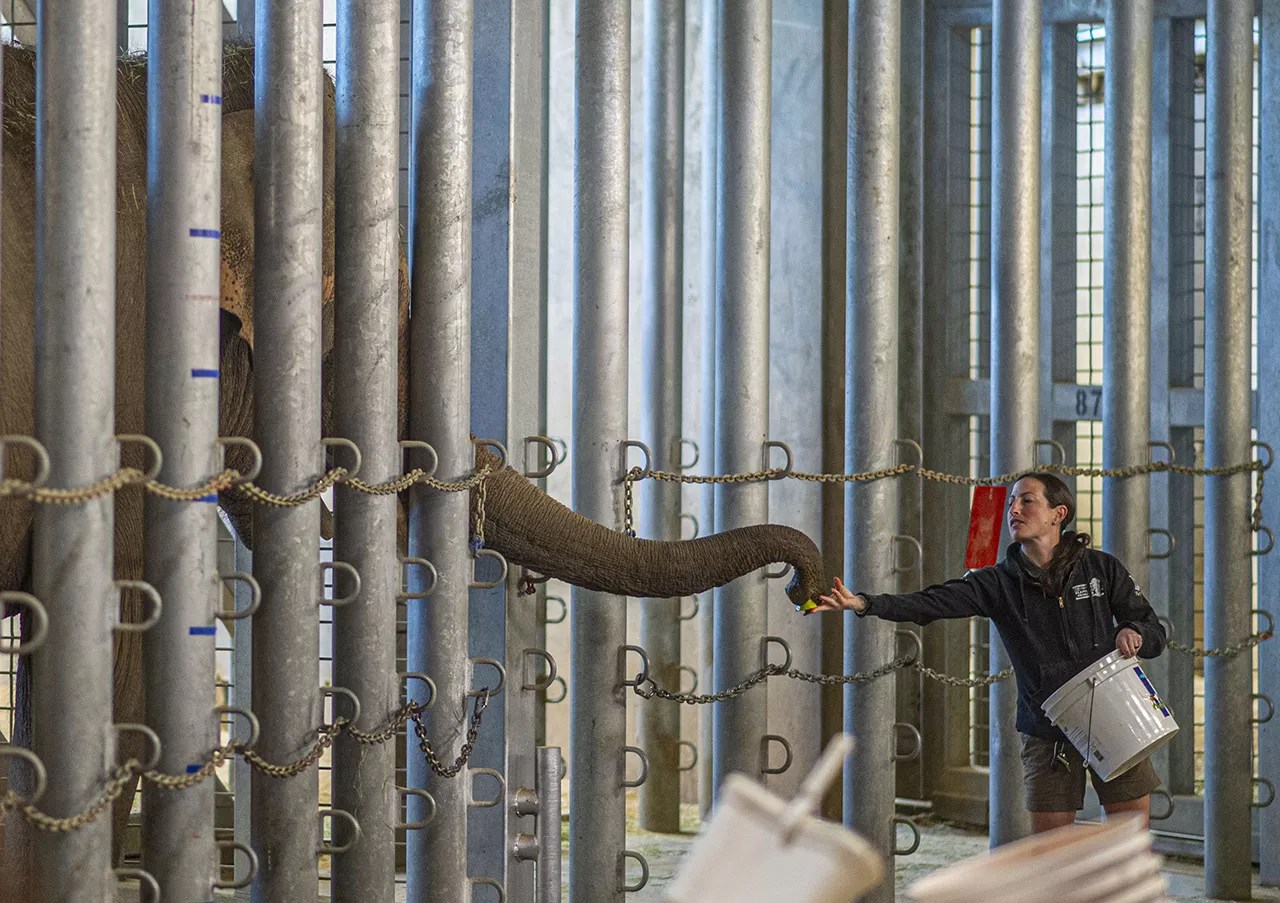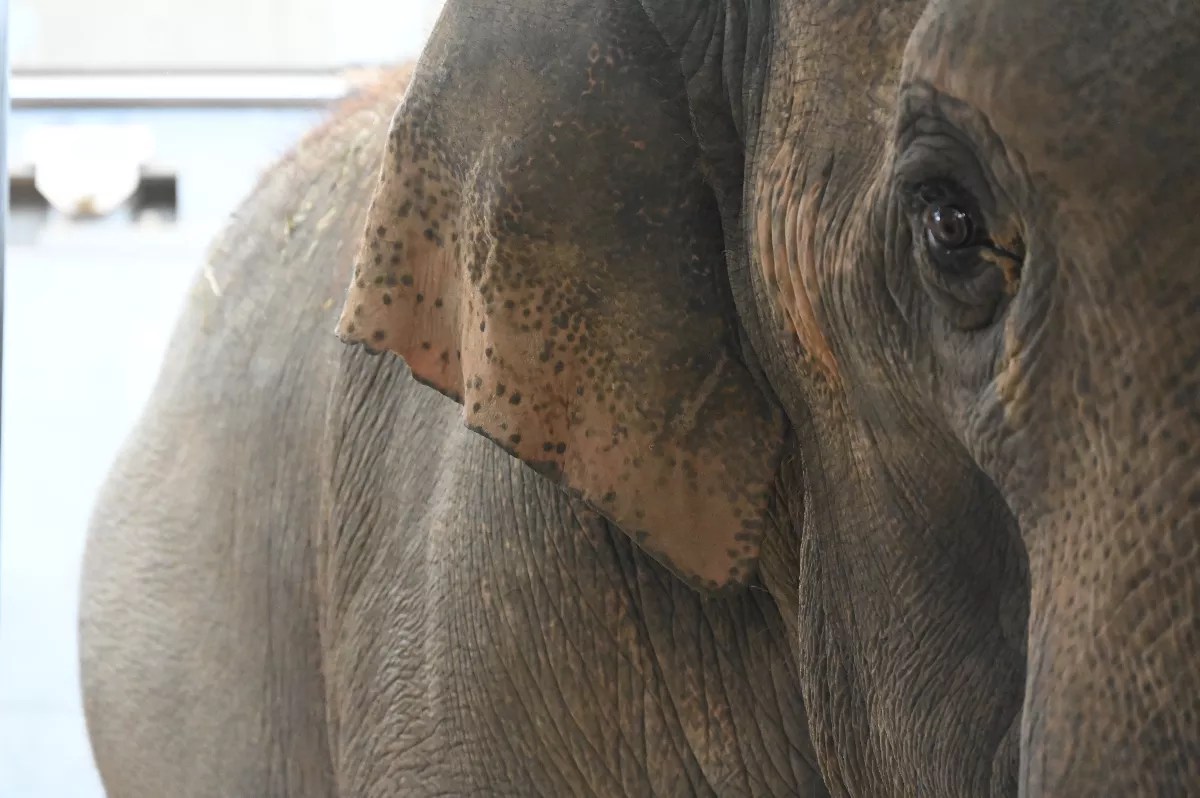
Evan Semón Photography

Audio By Carbonatix
Last year was a good year for the Asian elephants at the Denver Zoo. They welcomed Duncan to their all-male group; another member, Jake, became a father through the zoo’s unique artificial insemination program.
But according to In Defense of Animals, a national activist group, the Denver Zoo deserved a spot on its list of the “Ten Worst Zoos for Elephants in 2023.” The bull elephants’ “quality of life is severely damaged because they live in a crowded, small area,” according to Courtney Scott, IDA elephant consultant. But the real shame, she says, is the “breeding program,” which landed Denver in the fourth spot.
“They have no females there, and as you know, elephants mate and have relationships with females,” Scott says. “Really, they’re just breeding machines. That’s their job. They don’t have an actual, true bull elephant life.”
The Denver Zoo just wishes that IDA would get a life rather than push an annual publicity campaign aimed at gaining attention for the organization. “Their accusations are baseless, lacking substance and evidence, and contradictory,” says Denver Zoo spokesman Jake Kubie. “On the one hand, they suggest male Asian elephants shouldn’t be allowed time on their own; on the other, they criticize the Denver Zoo for providing male elephants a large, dynamic environment to socialize.”
When male Asian elephants reach sexual maturity, they get aggressive during musth, a period of heightened hormones, and female elephants kick out the bulls. Young male elephants will form bachelor herds as a result, usually with one older male elephant leading them.
Most zoos will keep young male elephants apart from their herd while they’re going through musth, Kubie says. The Denver Zoo had three female elephants, or cows, as recently as 2012, but that year, 53-year-old Mimi died. Then 44-year-old Kimbo died in 2014, and 52-year-old Dolly died in 2016. After Mimi died, the Denver Zoo went another route, putting together a bachelor herd with the hopes of collecting semen to contribute to research on how to preserve the Asian elephant species, which is critically endangered as its population drops below 40,000.
Six bull elephants live at the Denver Zoo: young adults Bodhi, Billy, Jake, Chuck and Duncan, along with 54-year-old elder Groucho. “The reality is that current wildlife research on male elephants finds that during adolescence, males leave their natal herd to join bachelor herds with other adolescent males, led by a dominant older bull mentor,” Kubie says. “That is precisely the environment provided here at Denver Zoo – and our six elephants are thriving as a result.”
“It isn’t that simple,” Scott responds. “Yes, elephants do leave the matriarchal herd, [but] they come back and mate, for one thing, and they also visit.”
IDA is critical of the procedure the Denver Zoo uses to extract semen from the elephants, which involves a keeper putting an arm in the elepant’s rectum to massage the prostate until the animal ejaculates.
Scott calls it an “invasive sperm extraction procedure” and “not a fun thing to go through,” and IDA describes the bachelor herd as “six sparring males with one job: pump out babies for profit.”
The Denver Zoo stands behind the procedure it uses to collect elephant semen, however, and allows elephants like Billy to opt out if they show no interest.
Although Billy takes no part in the breeding program that landed the Denver Zoo on IDA’s list for the second time, he was the reason for its debut appearance in 2013, when the zoo was just starting to build its bachelor herd. The Denver Zoo made the list that year because it had brought Billy in from Belgium. That was reportedly the first time that an Asian elephant had been imported in thirty years.
“The Denver Zoo set a dangerous precedent in 2013 by bringing a young bull from Europe,” according to the IDA. “It’s no secret that housing male elephants is a challenge, but adding to their numbers to bring in ‘new blood and genes’ when existing captive elephants desperately need better conditions defies reason.”

Jake is one of two elephants at the Denver Zoo to have had success with the artificial insemination efforts.
Maura Davis
Number one on the IDA list is the Los Angeles Zoo and Botanical Gardens, with the California-based IDA suggesting that the zoo’s 38-year-old bull, Billy, has brain damage “due to his constrained, unnatural existence.”
The Denver Zoo’s spot on the IDA list comes a month after the Cheyenne Mountain Zoo in Colorado Springs dodged a lawsuit filed by the Nonhuman Rights Project, an animal activism group from Florida.
In June, the NhRP sued to have the five African elephants at the Cheyenne Mountain Zoo – all females – released to a sanctuary because their coed enclosure at the zoo is “woefully inadequate.” The lawsuit was dismissed in December; the elephants “are not being unlawfully detained,” 4th Judicial District Judge Eric Bentley wrote in his decision.
Like the Cheyenne Mountain Zoo, the Denver Zoo is accredited by the Association of Zoos and Aquariums, but Scott claims that AZA standards “are fairly low” and should force zoos to give elephants more space and the males more contact with females.
“If you talk to elephant experts who know how elephants are, you’ll see how inadequate the AZA standards are,” Scott says. “They basically make it possible for city zoos, which can never be more than a few acres, to be accredited within a limited framework.”
“IDA’s characterization of the program is uninformed and oversimplistic,” Kubie says. “They don’t understand what is needed to protect Asian elephants from extinction.” In fact, he notes, the Denver Zoo does not make any money when it ships elephant semen to other zoos for either research or breeding, which is how Jake’s daughter was conceived last year.
“The pioneering techniques that Denver Zoo experts are developing, refining and perfecting to successfully collect and also cryogenically store and reanimate Asian elephant genetic materials is innovative science that supports a critical conservation need for an endangered species,” he says.
And according to Maura Davis, the curator of large mammals at the zoo, elephants are not forced to participate in the program. “The whole time, everything in front of them is wide open,” Davis says. “There’s hay they can eat, but they’re conditioned to back in and allow us to do the procedure, while the whole time they have the opportunity to leave.”
IDA’s annual list has been around since 2004, and touts its goal of seeing elephants moved into sanctuaries.
According to Scott, it’s realized success several times, mostly recently in 2023, by getting the Hogle Zoo in Utah to close its elephant exhibit after it appeared on the list twice.
But the decision by the Hogle Zoo to move their two female elephants to the Kansas City Zoo and Aquarium actually came three years after it was most recently on the IDA list. On its website, the Hogle Zoo cites wanting to meet AZA standards as the reason for moving the cows.
For Scott, the bottom line is that the Denver Zoo’s six bulls “need to be in a sanctuary or in the wild. That’s really the end solution for elephants, and especially male elephants.” And while time is running out for Groucho, the IDA notes that the elderly elephant “still has a few days left to spend in a warm, serene and peaceful sanctuary.”
“Groucho receives exceptional care at Denver Zoo that he would not receive in the wild and is unlikely to receive at a sanctuary,” Kubie responds. “Relocating a 54-year-old Asian elephant to the wild or another facility or institution that can’t provide the same level of care that he needs in his advanced age would amount to animal cruelty and ultimately a death sentence for Groucho.”
The Denver Zoo stands behind its entire elephant program, Kubie continues: “Denver Zoo is a globally recognized leader in Asian elephant care and well-being, and has one of the best Asian elephant facilities in the United States. We’re leading studies on male elephant behavior and hormones, and informing the entire scientific community on what Asian male elephants need to thrive under human care and in the wild.”
As examples of its contributions, Kubie notes that the Denver Zoo is part of the international Asian Elephant Species Survival project and is developing an Asian elephant conservation program in Laos to research reproduction and social behavior in the species.
“Semen collection is only one small part of a much larger effort to support an endangered species that’s experiencing declines in the wild due to poaching, habitat destruction and other issues,” Kubie concludes. “The Denver Zoo has state-of-the-profession facilities and profession-leading animal health and care expertise that enables us to provide world-class care for our elephants.”
Just ten days after the IDA released its list, the Denver Zoo received a seal of approval from American Humane, a leader in certifying humane treatment at zoos, along with a five-year certification for “demonstrating outstanding welfare and treatment of animals in its care” after undergoing “a rigorous independent assessment,” according to an announcement from the zoo.
“From our Asian elephants to the smallest frogs and fish, we’re fully committed to ensuring that all of our more than 3,000 animals are able to live their best lives,” says Brian Aucone, the senior vice president for life sciences at Denver Zoo, in the announcement. “This certification and our AZA accreditation further validates our animal care and health programs and honors our dedicated staff who commit their lives to our animals’ wellbeing and happiness.”
The original story has been updated to include information about American Humane.